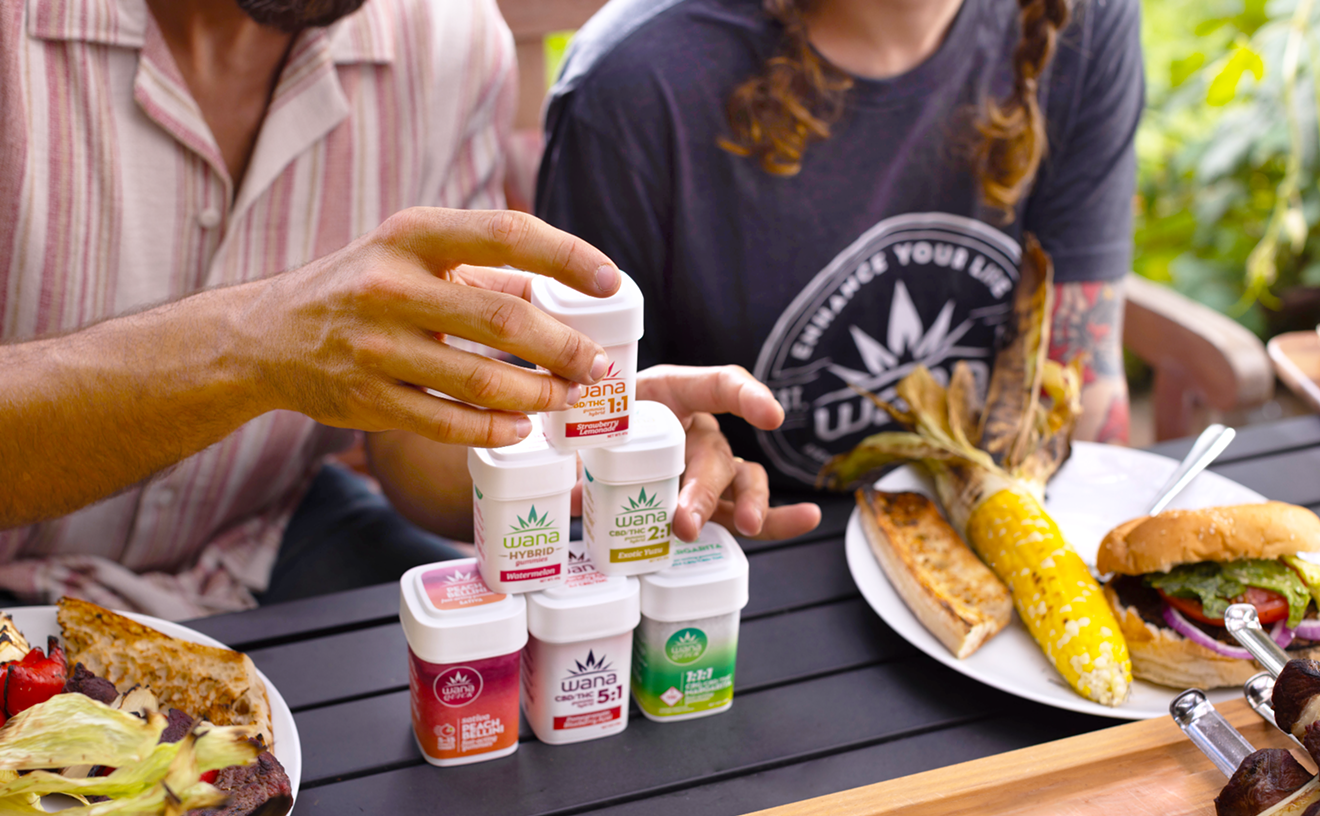Even as cannabis legalization is covered more and more by news outlets and Netflix, the plant is still trying to get rooted in the podcast world. Based in a cannabis hotbed, Colorado Public Radio hopes to succeed where others have failed with On Something, a ten-episode podcast series about America's twisted relationship with pot.
Hosted by CPR cannabis reporter Ann Marie Awad and now available through major podcast outlets, On Something tells stories about both people suffering from cannabis prohibition and those profiting from recent legalization efforts, and also discusses such topics as pot's impact on society and culture, addiction and more. We recently sat down with Awad to talk about the series, and how she plans to dissect our complicated history with cannabis.
Westword: How far does this podcast stretch nationally?
Ann Marie Awad: The whole idea is that it's a national show, but we are telling it from Colorado, because we have a new, unique perspective on it. We are not technically the first to do this, but we had the opportunity to trial-run a lot of things that other states ended up struggling with. But the irony is that because we were first, there were a lot of things that we didn't consider and other states beat us on.
We want to get out and do more stories from other parts of the country, especially in the second season, but even in the first season, we have stories based in Texas, hopefully Illinois and California. We want to start a national conversation about it.
How is the podcast going to tell the story of cannabis differently than previous documentaries and media coverage?
That's the tough thing: We're doing something that's been done a bunch of times. While we were making this, my editor asked if I'd seen a Netflix documentary about legalization that just came out and said I need to watch it to make sure we don't copy it accidentally [laughs]. But I think we really wanted to focus on every chapter of the way, and the people affected by this. In the beginning, we talk about these Victorian mothers taking heroin for toothaches and so on, but we are very clear about how young Mexican and black men were arrested for this. And then it goes on to become someone in the counterculture, like a hippie or beatnik, but still someone who is white and benefits from a certain level of privilege — and then the conversation sort of changes.
We wanted to connect all of that to now, especially when it comes to California. A lot of people don't understand that marijuana tends to be closely linked to those who are on the margins of America. We want to focus on the people who didn't have control over that story.
Part of the manifesto here, so to speak, is that marijuana is something that has been a part of American life and culture for a long time, far before legalization — and we have to treat it that way. I do feel like there's this journalistic quaintness sometimes when covering legalization. But it feels like we've been doing this long enough to where the conversation can get into some more meaty stuff.
How can a CPR podcast take advantage of that chance to get into the meaty stuff?
The whole reason this podcast came about was because legalization is something the public media needs to have a hold on and help people understand — because that's the essence of what we do. If you look at the public-radio programs people connect with the most, like Science Friday, TED Talks or Fresh Air, it's stuff that people are curious and want to know more about. When it comes to a topic like this, there's so many unknowns that people don't know what they don't know. So we have this unique advantage in public media to be a trusted voice in an area where, frankly, there's a lot of bullshit.
If you Google questions about marijuana legalization now, there's not a lot of reliable things that come up. I'm not disparaging websites like Leafly, Weedmaps or anything like that, but you want to be able to trust where you're getting your information from, and people already have a relationship with public media that's based on trust. It's also a really great way to bring people into public media who might not have sought it out before. I truly believe there are people out there who just want to better understand what's going on around them, even if they don't care about pot. This is a civic issue now, and there are people out there who want to be better and more informed citizens. I feel like there's more than enough opportunity in that audience to own this area.
Where will season one take listeners?
Right now, I'm working on an episode about immigration and how legalization can adversely collide with our federal immigration laws. We are basically obliged to an episode about CBD [laughs]. So for everyone who's been asking, I can tell you there will be a CBD episode in season one. I really want to examine these new spates of social-equity legislation that are being passed in states that are legalizing, with the most recent being Illinois. Like expungement, it's just unprecedented. We don't have a parallel to anything like this. A week or two ago, we had the first congressional hearing on reparations, and when Illinois's governor signed the marijuana legalization, he said it provided reparations. This is getting bigger than pot.
We're also going into cultural stuff. We have an episode coming up about spiritual relationships with weed. People hear about the International Church of Cannabis and think it's a novelty, but we wanted to take the idea seriously and spend some time with it. Our next episode focuses on expungement, and we follow two people in Colorado from the moment of arrests to their searches for housing and jobs. We show very clearly how these convictions intersect with their lives, and then we talk about what options are and aren't available to them because of the state they live in and the nature of their convictions. We have an episode about marijuana addiction coming up with a writer from Texas, Neal Pollack, who spent about two hours with us to tell us his story.
How long do you think cannabis will command this kind of attention?
When people stop caring about it — but I don't think that's going to happen any time soon. Cannabis has always captured our imagination, even if you're not that fond of it. We have ideas and perceptions about it, and it's such an indelible part of who we are in this country. I know some people will read this and [disagree], but it is. It's had such a profound impact on who gets deported and who doesn't, who gets arrested and who doesn't, who has felonies on their record and who doesn't, who can start a business and who can't. Until those interesting questions and dilemmas go away, there's always going to be a need for this kind of reporting.
There's also a funny parallel with alcohol. People talk about getting to the point of where pot isn't hyper-regulated, but we haven't even gotten to the point of that with alcohol, really. Didn't we just get rid of near-beer in gas stations? Blue laws are still a thing all over this country. It's so intertwined with our identity as a nation — this Protestant struggle about sobriety, temperance and seriousness versus madness, the wilderness and [whispers] colored people.
What have you taken away about cannabis since starting the podcast?
It's funny, because we all want to appear on talk shows and say "I'm the expert on this thing," but there are no experts on this. Nobody. All I am is a very curious person who can ramble on about this all day. But I've taken away a lot. I've taken away this wild ability to convince people that legalization affects them now, which definitely helps sell this podcast. I mean it when I say legalization is a civic issue. If you're a person in this country who votes and spends taxes, then this matters to you.
We were looking at a future episode about the marijuana voter. Who is this person who's likely to vote for decriminalization or legalization? Who voted for marijuana decriminalization here in Denver years ago, and Amendment 64 and the recent psilocybin measure? Every time a state votes to legalize, that is a seismic shift in policy. It's like watching the people who are voting based on health care or jobs. It's really important to know what's going on in this country.
[
{
"name": "Air - MediumRectangle - Inline Content - Mobile Display Size",
"component": "12017618",
"insertPoint": "2",
"requiredCountToDisplay": "2"
},{
"name": "Editor Picks",
"component": "17242653",
"insertPoint": "4",
"requiredCountToDisplay": "1"
},{
"name": "Inline Links",
"component": "18838239",
"insertPoint": "8th",
"startingPoint": 8,
"requiredCountToDisplay": "7",
"maxInsertions": 25
},{
"name": "Air - MediumRectangle - Combo - Inline Content",
"component": "17261320",
"insertPoint": "8th",
"startingPoint": 8,
"requiredCountToDisplay": "7",
"maxInsertions": 25
},{
"name": "Inline Links",
"component": "18838239",
"insertPoint": "8th",
"startingPoint": 12,
"requiredCountToDisplay": "11",
"maxInsertions": 25
},{
"name": "Air - Leaderboard Tower - Combo - Inline Content",
"component": "17261321",
"insertPoint": "8th",
"startingPoint": 12,
"requiredCountToDisplay": "11",
"maxInsertions": 25
}
]












